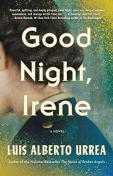
by Alberto Luis Urrea
Hardcover- $24.55
Click on the ORANGE Amazon Button for Book Description & Pricing Info
Overall rating:
How would you rate this book?
Member ratings
Good Night, Irene-Luis Alberto Urrea, author; Barrie Krenik, Luis Alberto Urrea, narrators
With this novel, the author has tried to give the world the historic picture of his mother’s service to the country during World War II. Apparently, the women who worked for the Red Cross, still remain largely unsung. They served a purpose that some might mock, but those soldiers who were the recipients of their kindness felt decidedly different. The author’s mother was part of a program using clubmobiles, a truck engineered to produce donuts and coffee for the soldiers. They drove where they were told, often to the front and were exposed to and in great danger. They were brave and fearless, for the most part, just interested in cheering up and inspiring the soldiers to continue their fight. They were well-trained, they had to be, because the field of war was not something to laugh about, and this brief respite was a welcome relief for the soldiers. They flirted and/or protected these women who were so motivated to help them. It was a different time however, and the reader might find some of the narrative unrealistic in today’s modern world, and in other ways, almost unrealistic for that time period. Women were subservient, women were only employed in certain positions, women “knew their place”. Because they were not officially soldiers, and because they were unarmed and not in the infantry, their contribution was largely ignored or mocked for all these years.
To tell the story of his mother’s sacrifice and struggles, when she returned, the author made up some of the characters and fashioned others with whatever information he was able to learn about them. His mother was one of the “donut dollies”, though they refused to be known as that, and she was so much more, he discovered, after reading her notes and diaries of those years. He discovered what motivated his mother, what memories she hid and what memories haunted her. In his presentation, some of the narrative seemed a bit trivial, like when someone says, ”pretty soon we will be flying around in spaceships”, and also it seemed too melodramatic and grotesque at times, and I wondered just how true it was. Could anyone have survived the collapse of the building as Dot and Irene supposedly did? Did the Nazis really remove the man’s eye with a spoon? The image was so gruesome and the man was described as so badly injured that it was hard to believe he was capable of speech, let alone walking around.
In addition to being about unsung female heroines, it is also a love story, a love story not only between men and women, but between friends, and it is well worth the read. The holes that may be discovered in the story are there by necessity, since little information about these women has survived, but the women Urrea writes about were indeed Red Cross soldiers, there is no doubt about that, and they deserve recognition, praise and a place in history. However, my view of the Red Cross, in light of how they have treated Israel over the years and currently, now, with the way they have ignored the hostages taken to Gaza by Hamas, leaves a lot to be desired for me, and my respect for that organization has largely diminished, if not disappeared entirely. They have identified more fully with the Middle Eastern Terrorists than with the only Democratic country in the Middle East that was attacked with devastating horror and force while there was an existing ceasefire that the terrorists broke, not Israel.
Book Club HQ to over 90,000+ book clubs and ready to welcome yours.
Get free weekly updates on top club picks, book giveaways, author events and more








